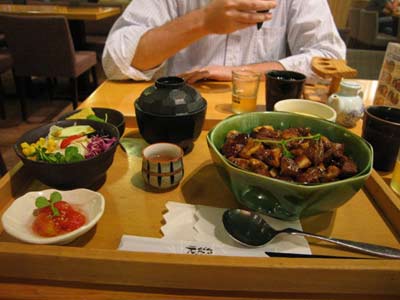|
 One of Taiwan's top Japanese restaurants is offering diners the use of a radiation gauge before they eat in case of any nerves in the wake of Japan's nuclear disaster. |
|
One of Taiwan's top Japanese restaurants is offering diners the use of a radiation gauge before they eat in case of any nerves in the wake of Japan's nuclear disaster. Diners at the upscale Peony in Taipei's Xinyi business and financial district can pick up the machine at the counter when they come in, check themselves for radiation or use it to check their food, general manager Catherine Yang told reporters. "I can give my customers a promise: if you eat at Peony I guarantee that everything you get will be the safest and the best," Yang said. "Customers have found it really interesting, not many of them have seen radiation gauges, and many feel very reassured," she added. The prospect of radiation releases after Japan's earthquake-triggered nuclear disaster has worried many in Taiwan, which is relatively close, has its own nuclear power plants and is, like Japan, prone to earthquakes. Japanese food is also hugely popular on the island, where the nuclear energy body has stepped up monitoring of imported goods from Japan and is checking all arriving airline passengers from Japan for radiation levels. Aside from slight radiation detected in a small shipment of broad beans over the weekend, which was, in any case, within legal limits, it has yet to find any contamination. Yang noted there was a lack of knowledge about radiation among the public, and offering the gauge was as much about reassurance as checking food that has already been inspected by authorities, and does not come from the affected areas of Japan. "Our head chef checked himself and wondered why his reading was higher than the fish and meat," she said. "But the fish and meat don't use computers or mobile phones all day and don't watch TV, so if they come from a safe place they are very safe to eat." "Many people don't understand that there are small amounts of harmless radiation everywhere in everyday life." (Read by Nelly Min. Nelly Min is a journalist at the China Daily Website.) (Agencies) |
台湾的一家顶级日本料理店将为食客在进餐前提供辐射侦测服务,以安抚日本核灾难可能引发的紧张情绪。 台北信义商业区牡丹高级餐厅的总经理凯瑟琳•杨告诉记者说,食客进入餐厅后,可以自己从柜台拿仪器侦测自己身上的辐射水平,或检查食物的辐射含量。 杨说:“我可以向我的顾客承诺:如果你们在牡丹餐厅吃饭,我保证你们所得到的一切都是最安全、最好的。” 她还说:“顾客们觉得自己进行辐射检查挺有意思的,很多人都没见过辐射检测仪,很多人都觉得很安心。” 因为台湾和日本相距较近,台湾也有自己的核电站,而且和日本一样,台湾也容易发生地震,所以在日本地震引发核灾难之后,台湾许多人都开始担心核辐射。 日本料理在台湾非常受欢迎。在台湾,原子能机构已经加强对从日本进口的商品的检测,并对所有来自日本的飞机乘客进行辐射水平的检查。 除了在周末从日本海运过来的一小部分蚕豆上检测出轻微辐射量(在安全范围内)外,还没有发现任何辐射污染。 杨指出民众对核辐射了解的不多,提供检测仪主要是为了让民众放心,其实当局已经对食物进行过检测,也不会进口来自日本受灾区的食物。 她说:“我们的厨师长也会给自己做检测,他很奇怪为什么自己的辐射值比鱼和肉的辐射值还要高。鱼和肉不会一天到晚用电脑或手机,也不看电视,所以如果它们来自一个安全的地方,那么食用它们也是十分安全的。” “许多人不理解,其实日常生活中到处都有少量无害的辐射。” 相关阅读 (中国日报网英语点津 陈丹妮 编辑:马文英) |
|
Vocabulary: upscale: 高档的;高级的 prone to: likely to suffer(易于遭受……的) broad bean: a type of round, pale green bean. Several broad beans grow together inside a fat pod.(蚕豆) |